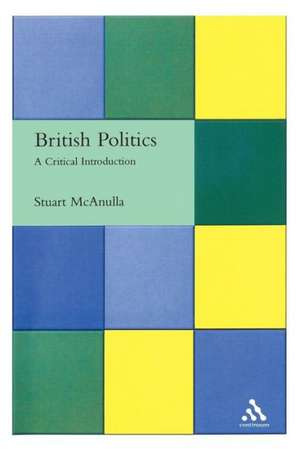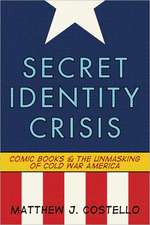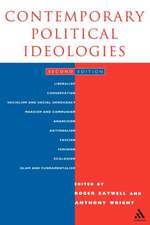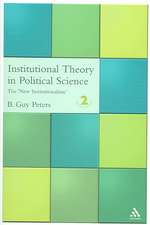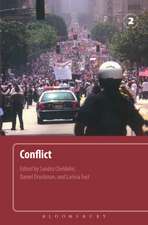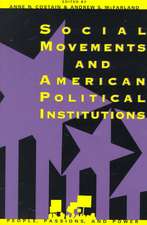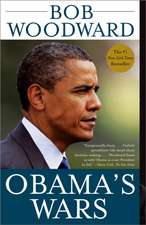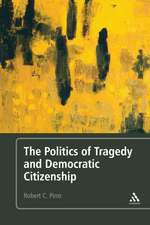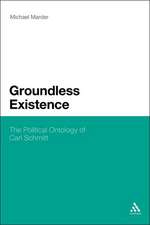British Politics: A Critical Introduction
Autor Stuart McAnullaen Limba Engleză Paperback – 14 dec 2005
| Toate formatele și edițiile | Preț | Express |
|---|---|---|
| Paperback (1) | 304.66 lei 6-8 săpt. | |
| Bloomsbury Publishing – 14 dec 2005 | 304.66 lei 6-8 săpt. | |
| Hardback (1) | 1064.84 lei 6-8 săpt. | |
| Bloomsbury Publishing – 14 dec 2005 | 1064.84 lei 6-8 săpt. |
Preț: 304.66 lei
Preț vechi: 332.88 lei
-8% Nou
Puncte Express: 457
Preț estimativ în valută:
58.30€ • 60.72$ • 48.60£
58.30€ • 60.72$ • 48.60£
Carte tipărită la comandă
Livrare economică 28 martie-11 aprilie
Preluare comenzi: 021 569.72.76
Specificații
ISBN-13: 9780826461568
ISBN-10: 0826461565
Pagini: 224
Dimensiuni: 156 x 234 x 17 mm
Greutate: 0.35 kg
Editura: Bloomsbury Publishing
Colecția Continuum
Locul publicării:London, United Kingdom
ISBN-10: 0826461565
Pagini: 224
Dimensiuni: 156 x 234 x 17 mm
Greutate: 0.35 kg
Editura: Bloomsbury Publishing
Colecția Continuum
Locul publicării:London, United Kingdom
Cuprins
1 Traditional Models of British Politics2 Contemporary Perspectives on British Politics3.Traditional Dynamics of British Politics I : Key Ideas4 Traditional Dynamics of British Politics II: Key Institutional Relationships5 New Labour in Power6 Modernising Government7 Constitutional Reform8 Conclusion: New Labour and the Study of British PoliticsBibliography
Recenzii
'British Politics: A Critical Introduction is a well-argued book which makes a refreshing change from the rather weighty multi-authored textbooks which tend to confront today's undergraduates.' - John Greenway, Political Studies Review
This is an odd sort of book, but one that many readers will find interesting and useful. McAnulla (Univ. of Leeds, UK) teaches social and political metatheory, and obviously believes in the power of theories and ideas to shed light on matters of importance. He argues that theory has been rather neglected (that old British practicality, one assumes). What McAnulla has provided is a wonderful compendium and inventory, almost a catalog, of a wide variety of topics in social science theory. The volume covers a range of ideas, including traditional models of British politics, current theoretical frameworks, dominant ideologies, key institutional relationships, and constitutional reform. Thus, McAnulla deals with the many analytical categories that have been used to analyze British politics. In the midst of what others have seen as a revolutionary shift, the author argues for the enduring power of the British political tradition. He even makes the argument that Blair's new labor can be accounted for in terms of traditional ideas and practices. A useful volume with a solid bibliography, but inexcusably expensive in hardback. Summing Up: Recommended. Upper-division undergraduates through faculty.
'valuable' ~ Eric Shaw, Times Higher Educational Supplement, November 2006
This is an odd sort of book, but one that many readers will find interesting and useful. McAnulla (Univ. of Leeds, UK) teaches social and political metatheory, and obviously believes in the power of theories and ideas to shed light on matters of importance. He argues that theory has been rather neglected (that old British practicality, one assumes). What McAnulla has provided is a wonderful compendium and inventory, almost a catalog, of a wide variety of topics in social science theory. The volume covers a range of ideas, including traditional models of British politics, current theoretical frameworks, dominant ideologies, key institutional relationships, and constitutional reform. Thus, McAnulla deals with the many analytical categories that have been used to analyze British politics. In the midst of what others have seen as a revolutionary shift, the author argues for the enduring power of the British political tradition. He even makes the argument that Blair's new labor can be accounted for in terms of traditional ideas and practices. A useful volume with a solid bibliography, but inexcusably expensive in hardback. Summing Up: Recommended. Upper-division undergraduates through faculty.
'valuable' ~ Eric Shaw, Times Higher Educational Supplement, November 2006
